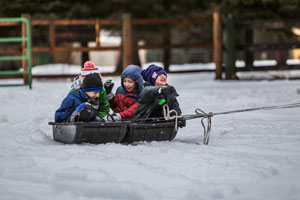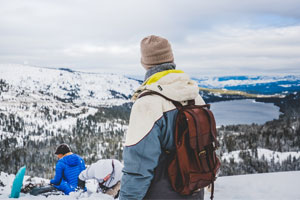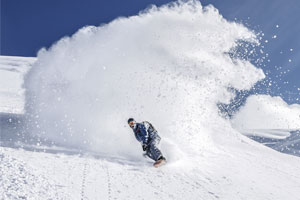Winter Shouldn’t Stop You
Winter Shouldn’t Stop You
Tips for Preventing Injuries While Participating in Winter Sports

More than 290,000 hospitalizations occur from winter sports injuries, with 193,000 attributed to mountain sports. More than 47,000 injuries occur from ice skating sports such as hockey and figure skating while 52,000 occur during sledding or snow tubing accidents. Due to the rural nature of some winter sports, they should never be performed alone. In the case of an accident, the other person may contact emergency support services.
Audra Molina, a nurse practitioner at the Larry Combest Community Health and Wellness Center stated they tend to see more slipping injuries during winter.
“Wearing appropriate shoes with tread can decrease the risk of slipping and falling,” Molina said. “When it comes to falls, however, we tend to see a high number of head injuries. Always wear a helmet when taking part in winter sports and never go out by yourself.”
Winter sports have a higher risk of falls, which can cause injuries to knees, arms and shoulders while putting athletes at risk for concussions. Skiers commonly tear their anterior cruciate ligament, or ACL, while erring on their skis. Bindings should always be tested and muscles should be warmed up before participating. Beginners should seek the training of professional instructors to learn how to perform basic maneuvers, such as how to fall correctly to reduce the risk of injury.

Although less skin is being exposed to the outside elements, wet clothes can cause skin irritations and infections. Blisters form from friction with wet socks and ill-fitting shoes. It is important to layer clothes in a way that will not cause rubbing. Layering clothes also helps athletes to accommodate their fluctuating body temperature.
“Layering with a waterproof outer shell is the key to staying comfortable,” Molina said. “Sunscreen is equally important to protecting skin, despite most skin being covered by heavy coats and jackets. More radiation actually hits the skin when there is snow on the ground. Many people mistake their sunburns for frostbite. Any part of the skin that is exposed should be covered in sunscreen.”
Up to 80 percent of ultraviolet (UV) rays – double the typical dose of UV radiation on a sandy beach – are reflected off snow and back up into the atmosphere, creating another source of radiation through reflected light. To avoid irritation, carry a high-SPF lip balm to apply to the nose and lips, lather up on sunscreen and wear sunglasses or goggles to avoid snow blindness, which is actually a sunburn on the eye.
Molina said it is always best to check the weather before participating in any winter activities. Being well-prepared is the best way to keep athletes performing at their best.

Related Stories
Celebrating Veterans: TTUHSC’s General Martin Clay’s Legacy of Service and Leadership
From his initial enlistment in the Army National Guard 36 years ago to his leadership in military and civilian health care management roles, Major General Martin Clay’s career has been shaped by adaptability, mission focus and service to others.
Texas Tech University Health Sciences Center School of Nursing Named Best Accelerated Bachelor of Science in Nursing Program in Texas
The TTUHSC School of Nursing Accelerated Bachelor of Science in Nursing (BSN) program has been ranked the No. 1 accelerated nursing program in Texas by RegisteredNursing.org.
TTUHSC Names New Regional Dean for the School of Nursing
Louise Rice, DNP, RN, has been named regional dean of the TTUHSC School of Nursing on the Amarillo campus.
Recent Stories
The John Wayne Cancer Foundation Surgical Oncology Fellowship Program at Texas Tech University Health Sciences Center Announced
TTUHSC is collaborating with the John Wayne Cancer Foundation and has established the Big Cure Endowment, which supports the university’s efforts to reduce cancer incidence and increase survivability of people in rural and underserved areas.
TTUHSC Receives $1 Million Gift from Amarillo National Bank to Expand and Enhance Pediatric Care in the Panhandle
TTUHSC School of Medicine leaders accepted a $1 million philanthropic gift from Amarillo National Bank on Tuesday (Feb. 10), marking a transformational investment in pediatric care for the Texas Panhandle.
Texas Tech University Health Sciences Center Permian Basin Announces Pediatric Residency Program Gift
TTUHSC Permian Basin, along with the Permian Strategic Partnership and the Scharbauer Foundation, Feb. 5 announced a gift that will fund a new pediatric residency.
